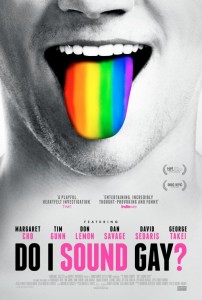Documentary Asks: Do I Sound Gay?

What does your voice sound like to you? For many people, listening back to recordings of their own voice is disorienting at best, and soul-crushingly embarrassing at worst. Concerns about how clearly we speak, the masculinity or femininity of our tone, and even the words we use all factor into the phobia of having your voice played back to you.
What’s behind this fear? Are we concerned that others will make fun of how we sound? Does the fear come from a sense of anxiety over whether how we communicate is suitable for a professional environment?
As a Texan, I consciously worked to avoid developing a Southern accent, largely because I thought that the distinctive twang present in the voices of my neighbors and friends made them sound less intelligent. I was also afraid that if I moved to the east coast (which I eventually did) that I would be made fun of for my hillbilly accent, and that people would assume I grew up on a farm and picked up cow poop all day.
This accent anxiety is even more pervasive in the LGBT community, which has long been stereotyped as sounding and looking a “certain way.” The media and entertainment industry have often depicted all gay men as looking and sounding like the overly-flamboyant stage designers and choreographers from The Producers, screeching and swooning like sorority girls that have had too much to drink. That’s not to say that people like that don’t exist in the LGBT community or that there is even a problem with flamboyance. However, by stereotyping all gay men as sounding and behaving a certain way, media executives cause millions of people within that community to have anxiety over how they speak, lest they be viewed as some sort of gay caricature from a movie.
This exact problem is highlighted in a fascinating new documentary called Do I Sound Gay? Directed by David Thorpe, the film features interviews with a long list of LGBT icons including Margaret Cho, Tim Gunn, Don Lemon, Dan Savage, David Sedaris, and George Takei.
While receiving only a limited release in select theatres around the country, this documentary asks crucially important questions that are highly relevant as American society undergoes a transformation in our approach to the LGBT community. By asking if there is such a thing as a gay voice, and wondering why some people “sound gay” but others do not, Do I Sound Gay? is a rare insight into an aspect of gay life not often explored—the self-imposed adjustment of language and voice.
What was clear from the documentary is that there is no clear path to the “gay voice.” For some, the change is gradual, the result of exposure over an extended period of time to a group who speaks in a way different from the mainstream, or because an individual might grow up paying more attention to women instead of men. For others, the change is much more rapid, taking place over a few weeks or months as they rapidly adjust to being open with their sexuality and personality. Essentially, the cause for the so-called gay voice is something that linguists will have to devote more time to before a definitive answer can be agreed upon.
Perhaps my biggest takeaway from Do I Sound Gay? was a newfound recognition and appreciation of my privilege as a straight male: my slight Southern accent might embarrass me, but at no point does it provoke housing or employment discrimination, nor does it serve as the catalyst for a physical assault. Sure, the odd person may laugh when I say “ya’ll” instead of “you all” or “you guys,” but I don’t have to worry about landlords refusing me housing because of concerns over the “gay lifestyle.” I certainly don’t have to worry about getting jumped outside of a bar or a restaurant because some bigot heard me speaking from across the room and decided to act upon his homophobia.
As human beings, we all spend too much time in our own heads worrying about how we look and sound, but for LGBT Americans that neurosis is justified because being completely true to who they are may be an invitation for discrimination or violence. Institutional homophobia may be on its way out in the United States, but until social prejudice towards the LGBT community is stomped out, many Americans simply won’t feel comfortable “sounding gay” for fear of the very real consequences.
